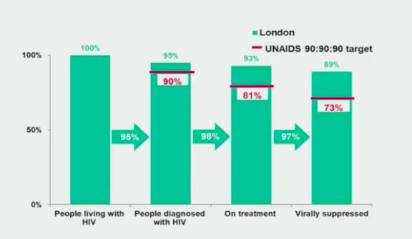EACS 2021: a call for collaborations and for both HIV and COVID-19
31 October 2021. Related: Conference reports, Treatment strategies, HIV prevention and transmission, EACS 18 London 2021.
Simon Collins, HIV i-Base
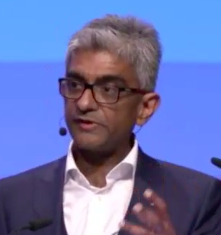
Dr Sanjay Bhagani, conference co-chair, EACS 2021.
On Wednesday 27 October, the 18th International European AIDS Conference was opened by conference co-chair Dr Sanjay Baghani with an appropriately-focused reflection on the parallels between HIV and COVID-19 and a call to improve future care of both.
This recognised that the COVID pandemic has changed the world for us all, and more directly than we ever would have wanted. And how both pandemics should focus on inequalities in care, as these are areas we can hope to improve.
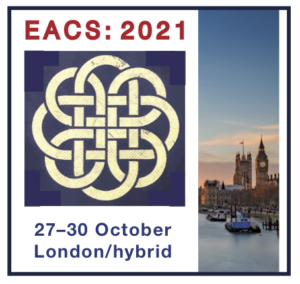 For all the remarkable achievements – and there are many – HIV still remains a global health crisis, even if we do achieve 90-90-90 targets. And the map for better access to HIV care mirrors that showing the biggest inequities in global access to COVID-19 vaccines.
For all the remarkable achievements – and there are many – HIV still remains a global health crisis, even if we do achieve 90-90-90 targets. And the map for better access to HIV care mirrors that showing the biggest inequities in global access to COVID-19 vaccines.
The theme of this year’s conference is “crossing borders”. This includes the importance of learning from each other to share ideas – whether these are geographical, clinical, or across multi-disciplines. The importance of collaboration ran through all the other opening talks.
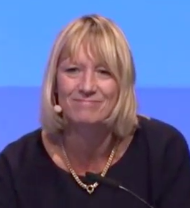
Dr Annemarie Wensing, conference co-chair, EACS 2021.
Conference co-chair Dr Annemarie Wensing started with a tribute to Charles Boucher, who died earlier this year, and who used his brilliance as a scientist to also bring people together as an educator, inspiring people to collaborate.
Dr Wensing then talked about some of EACS current projects. The organisation currently has more than 2600 members, approximately divided equally between each of the four main regions of Europe and the rest of the world. One project is to focus on the standard of care in Europe, closely linked to the EACS clinical guidelines, with the 11th edition due to be launched on the last day of the conference. EACS also support the training of new investigators and doctors and are due to expand the long-running training schools and other educational training .
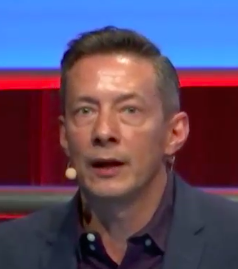
Matthew Hodson, conference co-chair, EACS 2021.
Community involvement in EACS 2021 was covered by Matthew Hodson, the community co-chair for the conference, who emphasised the importance of the diversity of people living with HIV and of including local HIV organisations like Positive East and the UK AIDS Memorial Project. He spoke of his personal experiences of living with HIV, and thanked everyone attending for their role in developing the medical advances in treatment. And, moving forward, he spoke of the importance of U=U to actively challenge the stigma associated with HIV that continues, at least in part, as a legacy of fear from the UK government’s tombstone campaign.
The keynote lecture from Professor Kevin Fenton reported on the progress in reducing HIV transmission in London, acknowledging so many people who contributed to the reductions over the last five years.
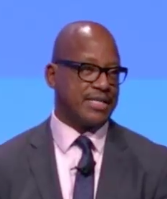
Dr Kevin Fenton, EACS 2021.
Approximately half of the 105,000 people living with HIV in the UK, where testing, monitoring and treatment are all free, live in London. Based on 2019 data, this has helped the city reach an impressive 95-93-89 cascade passing the UNAIDS 90-90-90 target.
This is also based on combination prevention that include more frequent testing, early ART on diagnosis and HIV prevention programmes. HIV prevention in London also included broad and expanded use of PrEP by gay men, despite long delays from the NHS. Although this was not mentioned specifically, it was the reduction in this population that drove the overall drop in HIV diagnoses.
As in nearly all settings, late diagnosis is still a significant concern in the UK. In this London is doing well, reporting that 7% of people are still diagnosed with a CD4 count that is less than 350 cells/mm3 – but this compares to the national average of 40%. Rates are still significantly higher for those of black African ethnicities.
Fast Track Cities in London is another ambitious collaboration coordinated across the city to achieve zero new infections, zero HIV preventable deaths and zero stigma by 2030. And for all the challenges, it is also okay to hope that some of these goals might happen earlier.
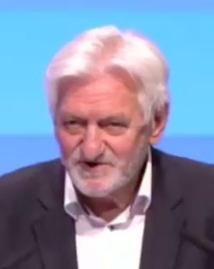
Professor Andrzej Horban, co-recipient of the EACS Award, 2021.
The opening ceremony included two awards from EACS in recognition of sustained contributions of excellence to HIV care. The first was awarded to Professor Andrzej Horban who has specialised in infectious diseases for 50 years. He developed and led HIV services in Poland, from treating the first cases to establishing and running the largest national clinic for over 25 years. Professor Horban also cochaired the EACS conference when it was held in Warsaw in 2003 and brought a long-needed focus on the importance of the HIV epidemic in eastern Europe.
Also, strange to report, but very gratefully appreciated, the second award went to me, in part to recognise the importance of community advocacy in HIV care. This is indeed an honour, and it was certainly accepted in this spirit, especially thinking of the many thousands of other community advocates who often work in much more difficult conditions.
In summary, EACS are to be congratulated for holding this year’s conference at such a difficult time and for leading with the first international fully hybrid meeting. It will be viewed simultaneously by more than 3000 delegates, a quarter of whom are attending in person, and 146 participants have been supported with scholarships.
The upcoming meeting has an exciting programme of over 90 oral and poster sessions over 120 hours that will cover everything including advances in ART, COVID-19, cure research and women’s health – with the active involvement of people living with HIV. Abstracts for the meeting are already online as open access as a supplement to HIV Medicine:
https://onlinelibrary.wiley.com/toc/14681293/2021/22/S3
Several community related projects at EACS include a display of the UK AIDS Memorial Quilts at the conference and exhibitions from HIV organisations. Also, a charity walk where anyone can take part to contribute to the 6864 kilometres between London and Lake Issyk Kul in Kyrgyzstan, where a summer camp for HIV positive children will be held next summer. The time taken to run, walk or travel by wheelchair is not important, but there are only 36 days to help as the run needs to be completed by 1 December 2021. [2]
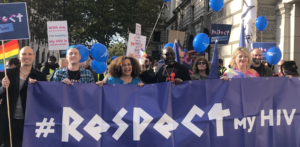
EACS march: (l-r) Jason Domino, Tom Hayes, Susan Cole, Revd Jide Macaulay, Dr Laura Waters. Saturday 30 October, London.
The end of the conference was marked by a march from Parliament Square to Trafalgar Square. This was open for everyone, whether attending the main conference or not.
It supported a campaign for respect for HIV and for the People First Charter on using person-centred language for people living with HIV. [3, 4, 5]
This was a wonderful event and a chance to meet friend and colleagues with an appropriately collaborative mix of community, doctors and activists – and an impressive list of speakers in Trafalgar Square. Many of these can be viewed again online thanks to a photographs and videos posted by Andrew London. [6]
- Opening ceremony and talks. 18th International AIDS Conference (EACS 2021), 27-30 October 2021.
https://eacs-conference2021.com - HIV run website.
https://life4me.plus/campaigns/hivrun - Campaign and march website.
https://respectmyhiv.com - People First Charter.
https://peoplefirstcharter.org - Community “Respect my HIV” march: 30 October 2021 in London
https://i-base.info/htb/41417 - Andrew London. Photographs and video clips from the speeches at Trafalgar Square.
https://www.instagram.com/mrandrewlondon
This article was first posted on 28 October 2021.


